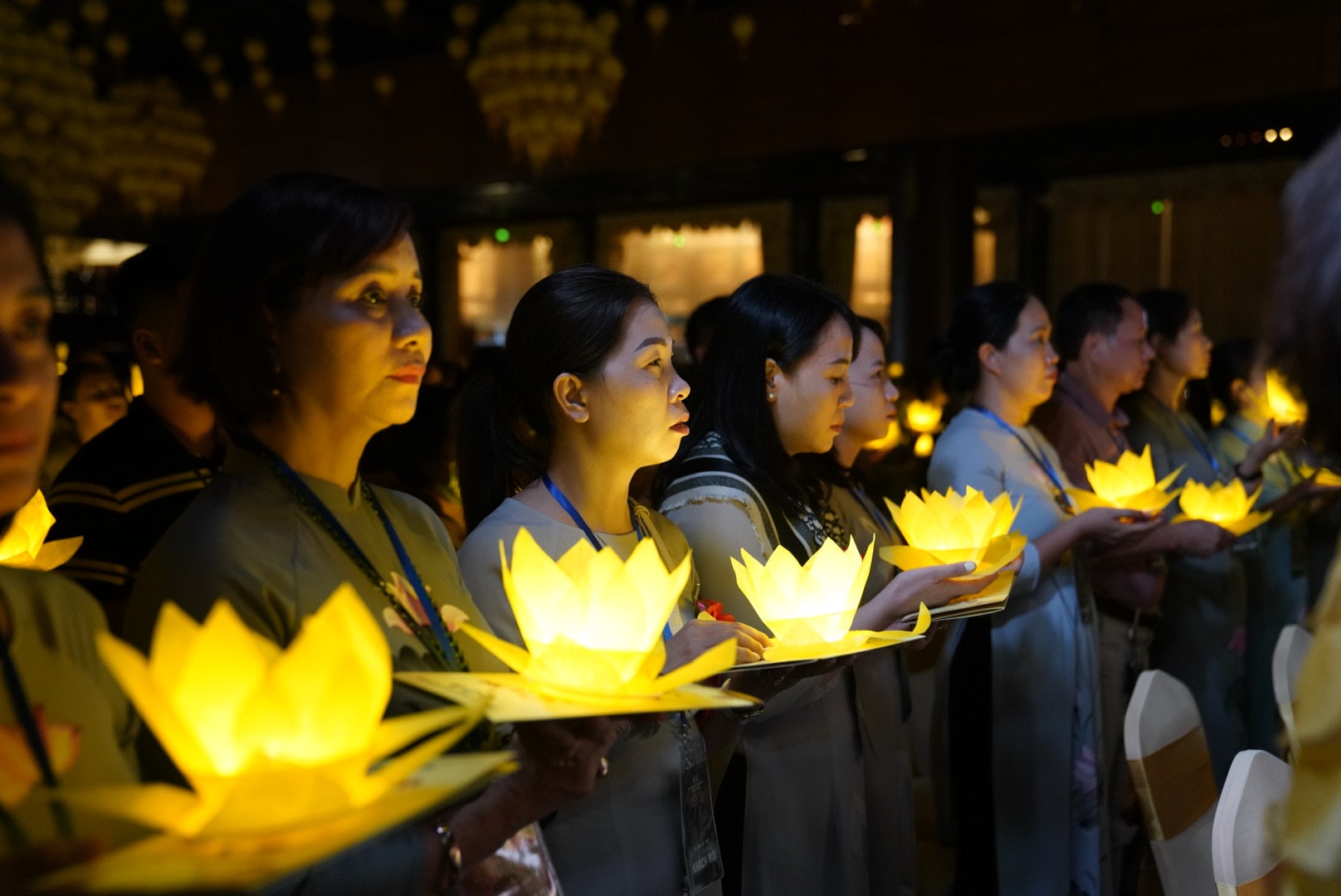Talking about Vu Lan is talking about the spirit of filial piety and gratitude, the spirit of salvation of Buddhism. But filial piety and gratitude according to the spirit of Buddhism is not about indulging in offerings and burning votive paper in the style of "the world is like the afterlife" as in folk customs.

Nowadays, everyone must know that the Vu Lan festival originated from the story of Maudgalyayana saving his mother in Buddhism. In the Vu Lan Bon Sutra, there is a story: During the time of the Buddha, in the Sangha, there was Maudgalyayana, the Buddha's most supernatural disciple. He had a deceased mother named Thanh De. After attaining supernatural powers, Maudgalyayana used his divine eye to look around the world, looking for his mother, and saw that she had been reborn as a hungry ghost, suffering and starving. Although Maudgalyayana was known as the most supernaturally powerful in the Buddha's Sangha, he could not help his mother get rid of her hunger and thirst. The bowl of rice that he offered to his mother, whenever he brought it to his mouth, burned like hot coals because of her evil karma. Following the Buddha's teachings, Maudgalyayana waited until the full moon of the seventh lunar month, on the day when the monks performed the self-ordination ceremony, ending the three-month retreat, to prepare a grand ceremony to offer to the Sangha, dedicating the merits to his mother. Thanks to the merit of that dedication, Mrs. Thanh De escaped the realm of hungry ghosts and was born in heaven.
Talking about Vu Lan is talking about the spirit of filial piety, gratitude, and salvation of Buddhism. Moreover, from a Buddhist ritual, Vu Lan has become a meaningful traditional festival season, arousing the sacred and noble feelings of people, making each child not only feel filial piety towards their parents and ancestors, but also deeply engrave the morality of drinking water and remembering its source with the country and people.
In our country, Vu Lan festival is also associated with the custom of offering offerings on the 15th day of the 7th lunar month - the day of "pardoning the sins of the dead" in folk beliefs. From the folk concept of "pardoning the sins of the dead" day, every year on the 15th day of the 7th lunar month, with the thought "the world is like the afterlife", many families spend money to buy a lot of votive paper items to burn "as a gift" to the deceased, considering it a way to show filial piety to grandparents and ancestors. Many families invest tens of millions of dong to buy offerings, display high trays of food to pray. But in reality, this way of showing filial piety and gratitude is not only not in accordance with the spirit of Buddhism, but also wasteful, costly, pollutes the environment and poses a risk of fire and explosion in the family and community.
According to the spirit of Buddhism, filial piety towards parents and grandparents must first and foremost be shown while they are still alive, knowing how to take care of and support parents both materially and spiritually because “parents are still alive in this world, like Buddha is still present”. The grace of giving birth and raising parents is as vast as the sky and the sea. As a child, one must know how to be filial, support and take care of parents, making them happy in this life. However, according to Buddha's teachings, that is still not enough to fully repay parents. In addition to filial piety, support and care for parents, children also need to help their parents know how to abandon evil and do good, accumulate merit, be kind, and plant good causes in this life. These good causes will bear sweet fruit so that parents are “happy now, happy in the next life”.
And when parents have passed away, the way to show filial piety and gratitude according to the Buddhist spirit is not to make offerings, offer high trays of food, or burn votive paper in the hope that parents and ancestors can enjoy it like those who are still living. According to the spirit of Buddhism, there are many different ways to express gratitude, but all must aim to bring practical benefits to both the living and the deceased. Children in the family should do many good deeds, such as upholding Buddhism, participating in and supporting charity programs, helping the needy, contributing to the community, releasing animals to save lives... to dedicate merit to parents, grandparents, and ancestors.
Before this year's Vu Lan season, the Vietnam Buddhist Sangha also issued a circular calling for avoiding organizing offerings in the form of spiritual services, performing rituals that are not in accordance with the Dharma, not burning votive paper, and at the same time encouraging people to perform practical good deeds, such as repaying those who have contributed to the country, helping people in difficult circumstances to transform into good karma to show gratitude to parents and ancestors.
Our Party and State respect freedom of belief but encourage people to save and practice a modern civilized lifestyle. In fact, in recent years, the majority of people have made great progress in awareness during the Vu Lan season. Instead of focusing on the form of worship and burning votive paper, charitable activities and gratitude are being widely promoted. However, we still need to spread more messages about filial piety and gratitude, so that every month and every day is an occasion for filial piety to be expressed, absorbed and honored.
The spirit of filial piety during Vu Lan season will certainly shine brighter, when each child knows how to live morally, knows how to repay the "four great favors" (four great favors), according to Buddha's teachings: repaying parents, teachers, sentient beings and the country.